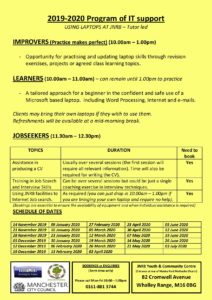

Manchester Care and Repair: Big Energy Saving Week 2020 – 20 Ways to Save
Save in the kitchen
- Use a bowl to wash-up rather than running a tap, reduce your washing machine use by one cycle a week, and only fill the kettle with the water you need and you could save around £36 a year in the kitchen.
- A dripping tap can waste more than 5,300 litres of water a year, so make sure your taps are properly turned off and change washers promptly when taps start to drip.
- Save in the bathroom
- Spend one minute less in the shower each day and a family of four could save £75 a year on energy and water bills.
- A running tap wastes more than 6 litres of water every minute, so turn off the tap while brushing your teeth, shaving, or washing your face.
- Replacing an inefficient shower head with a water efficient one could save a household of four people around £70 a year off gas bills and around £115 a year off water bills.
Save on lighting - Turn your lights off when you’re not using them. If you switch a light off for just a few seconds, you will save more energy than it takes for the light to start up again. This will save you around £14 a year on your annual energy bills.
- Replace your bulbs as and when you can with energy efficient LEDs – on average it could save about £35 a year on bills.
Save on appliances - Turning your appliances off standby mode can save you £30 a year and remember not to leave laptops and mobile phones on charge unnecessarily.
Save on heating - If you have a timer on your central heating system, set the heating and hot water to come on only when required.
- If you turn down your main thermostat by 1 degree, you can around 10% on your energy bill. But make sure your home is warm enough during cold weather. Cold homes can damage your health.
- Installing a room thermostat, a programmer and thermostatic radiator valves and using these controls efficiently could save you around £75 a year.
- Close your curtains at dusk to stop heat escaping through the windows and check for draughts around windows and doors.
- Draught-proofing of window and doors and blocking cracks in floors and skirting boards can save around £20 a year on energy bills.
Save by switching - Use the Citizens Advice energy price comparison tool to see if you can save money by switching energy tariff or supplier.
Save by getting extra support - Do a home energy check to find out about savings of up to £130 a year on household energy bills. Visit the Simple Energy Advice website and get personalised energy savings advice.
Visit your local Citizens Advice office to get advice in person about how to reduce your energy bills.
If anyone in your household is receiving benefits, contact your energy supplier and see what support they can provide. They should be able to tell you what help is available through the Energy Company Obligation.
If you need a little extra help from your energy company – including large print bills or more support during a power cut – you can apply to be added to your electricity network priority services register.
Check if you are eligible for the Warm Home Discount. Energy suppliers can provide rebates to households on certain benefits. The rebate is £140 for 2019/20 and you should contact your electricity supplier directly to see if you qualify.
If you live in Wales, contact the Welsh Government’s Nest scheme on 0808 808 2244 to see if you are eligible for a package of free home energy efficiency improvements such as a new boiler, central heating or insulation. If you are aged 60 or over and live in Manchester, you can also contact Manchester Care & Repair for help support with your energy costs. Or come and visit us at one of our upcoming events this Big Energy Saving Week, to see how we can help you.
News from Manchester Cares
MCR Cares – February Programme
Winter Wellbeing Flyer (updated for 2019_20)
Computer Classes

News, meetings, courses and events
Latest Newsletter from Age-friendly Manchester
|


Winter Wellbeing Flyer (updated for 2019_20)
Latest news and events from Manchester Cares:
https://manchestercares.org.uk/blog
_________________________________________________________________

D
|
|
|
|
|
Archive news about Transport…
Are we getting there?
Age-friendly transport across Greater Manchester
Greater Manchester Older People Network Conference Report – Liz Jones, Macc
The following 23 questions were raised by participants during the course of the morning workshop.
Some were posed to Andy Burnham and the expert panel in the afternoon. The rest have now been submitted to Transport for Greater Manchester and the Greater Manchester Ageing Hub for responses.
- How will we prioritise investment and coordination of community transport schemes (such as Ring and Ride)?
- How do we get a complimentary, localised, fully accessible, funded, door to door transport service?
- How can the design of transport be improved? This can include better information, bus stops, seating, interchanges, training etc.
- How can we ensure that there is a consistent good level of training for understanding various needs across all transport?
- How can we expand and better tap into existing community assets, such as volunteer schemes, minibuses, taxi sharing etc?
- How are you going to better involve older people in decision-making around public transport? Are bus drivers currently given training run by older people/people with disabilities? If not, could they be in future?
- How do we involve older people in designing new provision For example, there are issues with the new Bolton interchange which could potentially have been avoided with a better commitment to co-design.
- Why cant free bus pass be used before 9:30am when a lot of hospital and health appointments are made before 9:30 am?
- Can we develop a more comprehensive network for Park and Ride?
- It is difficult to access toilets at main transport stations/interchanges. Can transport maps highlight local toilets and flag up community toilet schemes and/or publicise other nearby toilets?
11.Why isnt parking on pavements illegal in Greater Manchester?
12.Is a congestion charge for Manchester a consideration looking ahead?
13.How do we propose to make community transport more age-friendly, along the lines of the Ring and Ride scheme?
14.When is re-regulation of buses going to happen?
15.Can transport links/routes be linked or better integrated with hospital and health care locations? For example, having maps on display of bus, tram and train routes, indicating stops and routes for local hospitals and health centres.
16.Promotion what currently available, such as taxi vouchers, hailer cards etc. While these are available, they are not sufficiently known about. How do people find out about these? Can they be promoted more widely and at relevant times?
17.Are you surveying older people satisfaction of public transport? If so, can you share the results with the GMOPN?
18.Do you think it is right to ask people to surrender their bus pass in order to qualify for the taxi voucher scheme? Could both offers be flexible?
19.How do we help people not on main routes? Even a five-minute walk can be a real challenge.
20.Who can we can communicate with to get answers to questions and to be able to feed our ongoing concerns into transport planning?
21.Can we have real-time information displays at bus stops, as the case with trams and trains?
22.How are you going to better synchronise the bus, tram and train services?
Once we have received responses, we will publish a set of replies on our website at
www.manchestercommunitycentral.org/policy-and-influence/gm-older-peoples-network
Read the report below:








